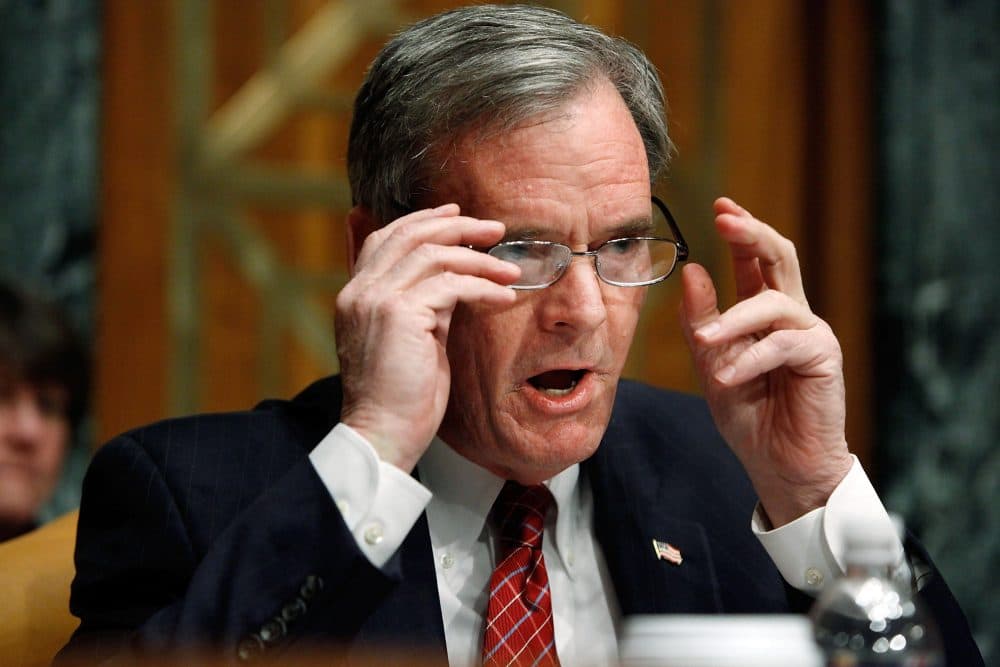Advertisement
'We're Headed Over A Cliff': Former GOP Sen. Judd Gregg On The Deficit

A new projection from the Congressional Budget Office predicts a more than $1 trillion deficit in about two years. That estimate takes into account both the $1.5 trillion tax cut passed last year and the $1.3 trillion spending bill Congress passed in March.
Former New Hampshire governor and Republican Sen. Judd Gregg, who served as chair of the Senate Budget Committee, tells Here & Now's Peter O'Dowd that Republicans have abandoned fiscal responsibility.
"We're headed over a cliff as a nation," says Gregg, now co-chair of the Campaign to Fix the Debt (@FixtheDebt), part of the nonpartisan Committee for a Responsible Federal Budget. "We're on a track that's totally unsustainable."
Interview Highlights
On his reaction to the CBO's projection
"[It means that] at some point in the future, we're gonna have a fiscal issue that's very significant, some sort of fiscal crisis, and that we'll inevitably pass onto our children a lower standard of living, because they'll have to pay down all this debt that we've run up during our generation and pass that debt onto them. And that will reduce their standard of living, and it's not right. We should be much more fiscally responsible than we're being as a government."
"You can logically presume that at some point there'll have to be some sort of effect on the value of the dollar."
Former Sen. Judd Gregg, on the potential impacts of a rising deficit
On whether this is an unprecedented situation
"We haven't had what we're headed towards, which is a nonwar situation where our debt-to-GDP ratio will probably exceed 100 percent. Historically, our debt-to-GDP ratio up until 2008 was at 35 percent, which made us a very strong and healthy nation. But under the Obama administration, it doubled, and now it's still going up at a very exponential rate. And it's driven almost entirely by Medicare, Medicaid and Social Security spending, the three major entitlement programs, which are absorbing massive amounts of the federal budget and are not being paid for as they spend to fund these safety net programs for senior citizens. And that spending's being driven by the fact that you have the largest generation in the history of our nation retiring, so we're going from 35 million retired people to 70 million retired people, and the system isn't built to sustain that.
"What will happen down the road? Nobody really knows, because it's never happened before. But you can logically presume that at some point there'll have to be some sort of effect on the value of the dollar. In other words, you'll get an inflationary event, and instead of paying the dollars back in the real terms that the dollars were borrowed at, they'll be paid back as inflated dollars, which means they'll be worth a lot less, and thus people who lend us money will say, 'Well, we're not gonna lend you money unless you pay us a lot more interest,' and that starts the downward spiral."
Advertisement
On what's driving the debt increase, and whether defense spending is a factor
"Well first off, defense isn't an issue in this debate. It's a discretionary account, and it represents less than 15 percent of the federal budget. The issue if you're going to be honest about it is Medicare. Social Security is also a big player. But Medicare's really the driver of our debt problem, because the cost of health care [is] escalating so fast. Do you have to cut these programs? I actually don't think you do. ... Social Security is actually very fixable. Medicare, much more complicated, but it can also be addressed through changing the way we reimburse under Medicare, going from a fee-for-service system to a capitated system, where you reward quality and outcome versus just utilization. Those are broad terms, but that's the direction you've got to go in.
"The problem isn't substantive. These programs can be fixed. The problem is political. These programs have been used as a political bludgeon for years, and anybody who goes near them gets bludgeoned. Unless you do a bipartisan fix, politics will be stuck into the debate and nothing will get done."
On how there hasn't been enough done in Washington to rein in spending, regardless of party
"This is not a partisan problem — I mean, the simple fact is that not only did the Republicans throw in the towel on spending, the Democratic Party has done that very aggressively. In fact, the Democratic Party is now being dominated in its dialogue by what they call progressives, who are essentially socialists. I mean, [Independent Vermont Sen.] Bernie Sanders is a socialist. But their view is that they can continue to spend profligately and let the bills go to the kids. And that's unfortunately what's happening."
This article was originally published on April 11, 2018.
This segment aired on April 11, 2018.